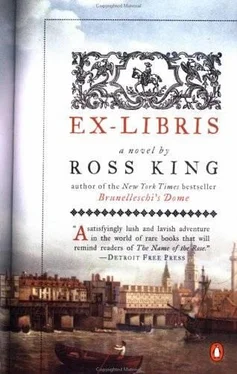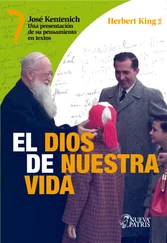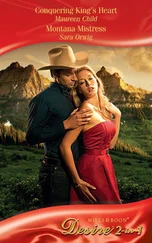The two of them had been sitting at the table in her room, whispering over a chessboard, a single candle burning in an eight-armed candelabrum. He had recited a familiar litany, claiming to know neither who was in pursuit nor whether they had anything to do with the men in black-and-gold livery. Nor did he know whether the men in black-and-gold livery might be in the service of Cardinal Baronius, or the Emperor, or else some other party entirely. But he admitted that among the hundreds of books he and Sir Ambrose had carted from Prague in the ninety-nine wooden crates were those from the library's secret archive-books outlawed as heretical by the Holy Office. Was the parchment one of them? Vilém claimed not to know. But the cardinals of the Inquisition would not take kindly, he said, to the liberation of the books from Prague Castle-nor to their transport to a heretical kingdom such as England. For included among the crates were such controversial treatises as the work of Copernicus that Emilia had seen in the wine cellar at Breslau. That particular volume, De revolutionibus orbium coelestium , had been suspended by the Congregation of the Index, he explained, following Galileo's brush with the Inquisition in 1616. Galileo's writings-both published and unpublished-were likewise found in the archives. And Galileo was, in the eyes of Rome, a most dangerous writer.
But still other documents were to be found in the ninety-nine crates. The secret sanctum in the Spanish Rooms had been greatly enlarged in the past few years, and not only because of the zeal of the Congregation of the Index. There were also stacks of lambskin in the archives, Vilém said, that catalogued the multifarious doings of the greatest empire on earth. For, some years earlier, when he was Archduke of Styria, Ferdinand had signed an agreement with his cousin and brother-in-law, the King of Spain. The treaty brought together the two Houses of Habsburg-the one in Austria, the other in Spain-who would henceforth work together to crush the Protestants in their midst. In those days there was much brotherly mixing of blood. Documents in the archives in Seville found their way into the Imperial Library in Vienna, and vice versa. Philip even sent to Vienna a copy of the Padrón Real , the map of his domains in the New World. But Vienna was no longer safe, for both the Turks and the Transylvanians threatened it. So it was that over the past few years many of the documents from the Imperial Library were sent for safekeeping to Prague Castle, to the secret archive in the Spanish Rooms. But then of course everything changed. Ferdinand was deposed from the throne of Bohemia and replaced by a Protestant.
Emilia closed her eyes and felt the room begin to revolve. The King of Spain? The wind outside was howling plaintively in the chimney-pots like the ululation of a wolf pack. The cardinals of the Inquisition? The candle guttered in the draught, drooling icicles of wax. What fatal Pandora's box had been prised open in Prague Castle? Not for the first time she was sensible of the danger-one worse than the biting cold or the ice floes on the Elbe-into which Sir Ambrose had plunged them. And was the Englishman a danger too, someone to be feared as much as their mysterious pursuers?
He entered her room a few minutes later, knocking on her door before entering with a brisk step. He seemed in a cheerful mood. He handed each of them a passport and certificate of health-both forged in false names-then turned to Vilém.
'I regret to say that, if my information is correct, you may also have need of these.' He extended a small calfskin pouch. 'In the event that we should be caught up, you understand. I am told they have several unpleasant methods of persuasion.'
'Persuasion?' Vilém accepted the small calfskin pouch and loosened the drawstring. Emilia, watching from the corner, saw Vilém sprinkle into his palm three or four small seeds.
' Strychnos nux vomitica ,' Sir Ambrose explained. 'From a tree in India. Brought back, I believe, from a Jesuit mission. Painless, apparently, and very fast. I've seen one work on a blackbird.' He paused. 'I should think one would do the trick; two to be safe.'
Vilém frowned. 'But how am I to…?'
'To what?'
'To persuade the men to swallow them?'
Sir Ambrose looked perplexed for a second, then burst out laughing. 'My dear fellow!' he exclaimed. He made a terrific show of wiping his cheeks with a handkerchief and suppressing further eruptions of mirth. 'No, no, my dear fellow. They're for you. You are the one who must swallow them, should you have the misfortune to let them catch you. Oh, dear me…'
One night later she was smuggled aboard the Bellerophon , escorted up the cleated gangplank in pitch-blackness, then led down a hatchway to the stale air of the orlop-deck, the lowest inhabited level of the ship. Her tiny cabin-another narrow cell into which she was thrust-smelled of gunpowder and pitch and the poisonous water in the bilges. As the Bellerophon made its way down the Elbe, she watched through a scuttle, alone in her cabin, as the sea turned the colour of a desert and ruffled its skirts along the shore. Then a few leagues out to sea, as the sandstone cliffs of Heligoland swayed into view, she was violently ill, and for what seemed like days on end she lay swaddled in her hammock, feeling the Bellerophon heave and pitch and creak across the immense sea. The ship's doctor visited her cabin and fed her preparations of ginger and German camomile. But even then, of course, she knew her illness was not to be cured by a few herbs; it was something graver and yet more wonderful than mere seasickness.
St. Olave's Church stands in Hart Street, near Crutched Friars, in the shadow of the Navy Office and Tower Hill. As I arrived, its front doors were yawning open, exposing a candlelit nave and a flock of departing parishioners. Evensong was letting out. I dodged past the small crowd, rounded a corner, then crept down a flexuous path towards the churchyard, whose gates were surmounted by a pair of stone skulls. The eye-sockets regarded me grimly as I passed on to the edge of the old burial-ground, hoping to look solemn and respectful, as churchyards demand, not like a miscreant bent on some sinister bit of mischief-which, for all I knew, I was.
It was the evening following my trip to Pulteney House, and for the second night in a row I was leaving Tom Monk alone in Nonsuch House. He had begun to suspect me, I believe, of some romantic attachment, a ridiculous suspicion, but one encouraged by the bouquet of flowers I was clutching in my hand. Yet this ritual-the flowers and the churchyard-had been a familiar one. Each Sunday for the past five years I had tiptoed into the outer churchyard of St. Magnus-the-Martyr, holding flowers to my chest and threading my way past the victims of plague and consumption and a score of other misfortunes to a familiar granite tablet surrounded by four tiny lozenges. But I realised with a soft pang of grief and guilt that I had not visited Arabella's grave for some time now, not since my first letter from Alethea and the visit to Pontifex Hall. I squeezed the stems more tightly and stepped uncertainly forward.
I had spent much of the day in Whitehall Palace, in the offices of the Exchequer, examining countless rate-books and poll-tax returns. I was hoping to learn more about Henry Monboddo before I was forced to confront him. Forewarned is forearmed, as my mother used to say. I had considered returning to Alsatia and making enquiries of Samuel Pickvance, but I was wary of raising the auctioneer's suspicions. He and Monboddo might be in league together, after all. So I had settled for the palace instead, to which a waterman conducted me, travelling upriver through the heavy morning traffic.
Читать дальше












